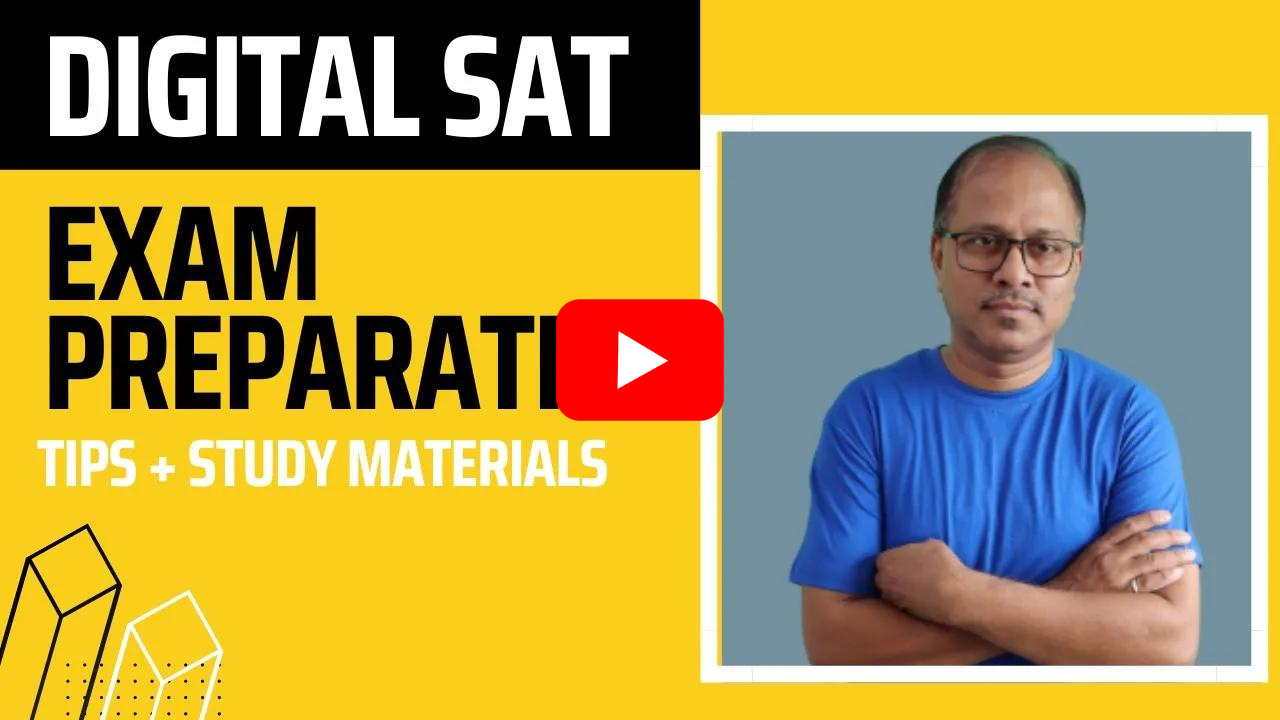
Maximize Your SAT Score: Join Our Prep Courses for Top Tips and Effective Strategies
Are you aiming for a top SAT score? Our expert-led prep courses offer the essential tips and strategies you need to excel. With personalized instruction and comprehensive resources, you’ll be well-prepared to achieve your best score. Don’t miss this opportunity to boost your confidence and your SAT score. Sign up today!
| Maximize Your SAT Score | Join Our Prep Courses for Top Tips and Effective Strategies |
| Benefits | – Expert-led prep courses |
| – Essential tips and strategies | |
| – Personalized instruction | |
| – Comprehensive resources | |
| Outcome | – Boost your confidence |
| – Achieve your best SAT score | |
| Call to Action | Sign up today! |
SAT Prep Online Courses Details:
|
Advanced Level |
Intermediate Level |
Intermediate Level |
Intermediate Level |
|
Digital SAT Prep Online – 42 hrs |
Digital SAT Prep Online – 60 hrs |
Digital SAT Prep Online – 72 hrs |
Digital SAT Prep Online – 90 hrs |
|
Rs. 58,174 |
Rs. 73,614 |
Rs. 90,134 |
Rs. 1,06,654 |
|
USD 696.67 |
USD 881.56 |
USD 1,079.34 |
USD 1277.16 |
|
Digital SAT (42 Hrs) Details: |
Digital SAT (60 Hrs) Details: |
Digital SAT (72 Hrs) Details: |
Digital SAT (90 Hrs) Details: |
| 1. Live & Interactive Real Time Sessions
2. Best English and Maths Experts For Digital SAT 3. High Score Course Modules 4. Session Wise Assignments 5. 3 Types of Tests – Online, Offline and Hard Copy 6. Practice of 3600 questions during the entire course 7. Comprehansive Study Material – Module Wise 8. Regular Doubt Removal Sessions 9. Rapid Reading Excercises 10. Suggested Reading Sessions 11. Special Tips and Techniques to get a perfect score |
1. Live & Interactive Real Time Sessions
2. Best English and Maths Experts For Digital SAT 3. High Score Course Modules 4. Session Wise Assignments 5. 3 Types of Tests – Online, Offline and Hard Copy 6. Practice of 3600 questions during the entire course 7. Comprehansive Study Material – Module Wise 8. Regular Doubt Removal Sessions |
1. Live & Interactive Real Time Sessions
2. Best English & Maths Experts For SAT 1 3. Scientifically Designed Course Modules 4. Session Wise Assignments 5. 3 Types of Tests – Online, Offline and Hard Copy 6. Practice of 3600 questions during the entire course 7. Comprehansive Study Material – Module Wise 8. Regular Doubt Removal Sessions 9. Rapid Reading Excercises 10. Suggested Reading Sessions 11. Special Tips and Techniques to get a perfect score |
1. Live & Interactive Real Time Sessions
2. Best English & Mathematics Experts For Digital SAT 3. Scientifically Designed Course Modules 4. Session Wise Assignments 5. 3 Types of Tests – Online, Offline and Hard Copy 6. Practice of 3600 questions during the entire course 7. Comprehansive Study Material – Module Wise 8. Regular Doubt Removal Sessions 9. Rapid Reading Excercises 10. Suggested Reading Sessions 11. Special Tips and Techniques to get a perfect score |
SAT Private Tutoring Classes:
|
SAT Tutoring / Course |
Hours Package |
|
Feature |
Description |
|
Personalized Instruction |
Tailored lessons address the specific strengths and weaknesses of the individual student. |
|
Customized Curriculum |
development of a study plan focused on the student’s goals and target scores. |
|
Flexible Scheduling |
Ability to schedule sessions at convenient times for the student. |
|
Individual Attention |
Dedicated attention from the tutor to address the student’s questions and concerns. |
|
Detailed Feedback |
Comprehensive feedback on practice tests and assignments is needed to track progress. |
|
Targeted Strategies |
Instruction on specific test-taking strategies and techniques to improve scores. |
|
Adaptive Approach |
Adjustments in teaching methods based on the student’s learning style and pace. |
|
Access to Resources |
Provision of study materials, practice tests, and supplementary resources. |
|
Continuous Support |
Availability of support between sessions via email or messaging for additional assistance. |
|
Performance Tracking |
Regular assessment of progress and performance to identify areas for improvement. |
|
Course Details |
Digital SAT Preparation Classes / One – on – One Tutoring in Middle East
|
Digital SAT Prep / Tutoring in Middle East |
Time Zone |
Schedule Demo Session Now |
| Digital SAT Preparation in Qatar | According To Time Zone | Schedule Demo Session Now |
| Digital SAT Preparation in Kuwait | According To Time Zone | Schedule Demo Session Now |
| Digital SAT Preparation in Oman | According To Time Zone | Schedule Demo Session Now |
| Digital SAT Preparation in UAE | According To Time Zone | Schedule Demo Session Now |
| Digital SAT Preparation in Saudi Arabia | According To Time Zone | Schedule Demo Session Now |
| SAT Preparation In Abha | According To Time Zone | Schedule Demo Session Now |
| SAT Preparation In Al khobar | According To Time Zone | Schedule Demo Session Now |
| SAT Preparation In Jeddah | According To Time Zone | Schedule Demo Session Now |
| SAT Preparation In Damman | According To Time Zone | Schedule Demo Session Now |
Digital SAT Preparation Classes / One – on – One Tutoring in USA
| Digital SAT Prep / Tutoring in USA | Time Zone | Schedule Demo Session Now |
| Digital SAT Preparation in California | According To Time Zone | Schedule Demo Session Now |
| Digital SAT Preparation in Texas | According To Time Zone | Schedule Demo Session Now |
| Digital SAT Preparation in New York | According To Time Zone | Schedule Demo Session Now |
| Digital SAT Preparation in New Jersey | According To Time Zone | Schedule Demo Session Now |
| Digital SAT Preparation in Florida | According To Time Zone | Schedule Demo Session Now |
| Digital SAT Preparation in Georgia | According To Time Zone | Schedule Demo Session Now |
Some Other Courses Offered by TestPrepkart:
| Live Online SAT Prep Course | SAT Bootcamp Course | SAT Tutoring + Live Online Class |
| 18 hours of immersive live instruction | Prepare for the Digital SAT in 2-3 weeks | Most Personalized |
| Fully updated for the Digital SAT | Learn from Expert SAT teachers | 10, 20, 30, or 40 hours of private, 1-on-1 tutoring |
| Realistic SAT practice tests | 18 hours of live instruction | Individualized guidance for the paper or digital SAT exam |
| Digital performance dashboard | Private 1:1 Q&A with teachers | Includes a complete, 18-hour Live Online SAT course |
| Learn from Expert SAT teachers | Realistic SAT practice tests, including 2 live proctored tests | Access to full-length, realistic SAT practice tests |
| Includes practice books and all on-demand lessons |
Book A Free Demo Session Now !
Digital SAT Math Live Session Classes:
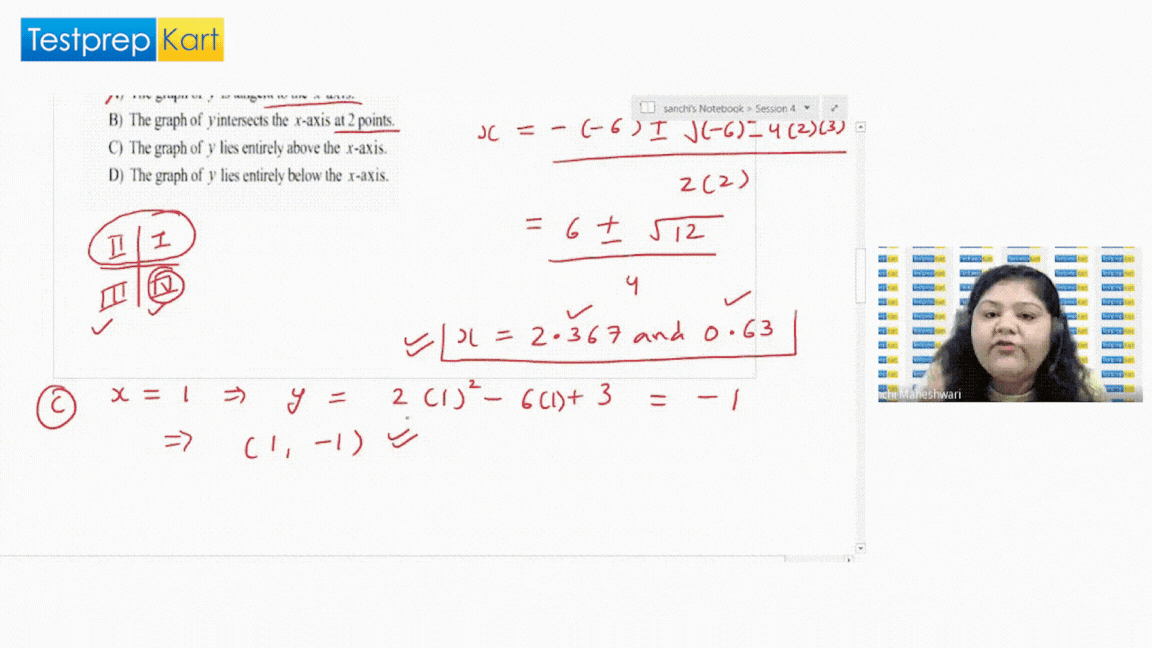
Digital SAT English Live Session Classes:
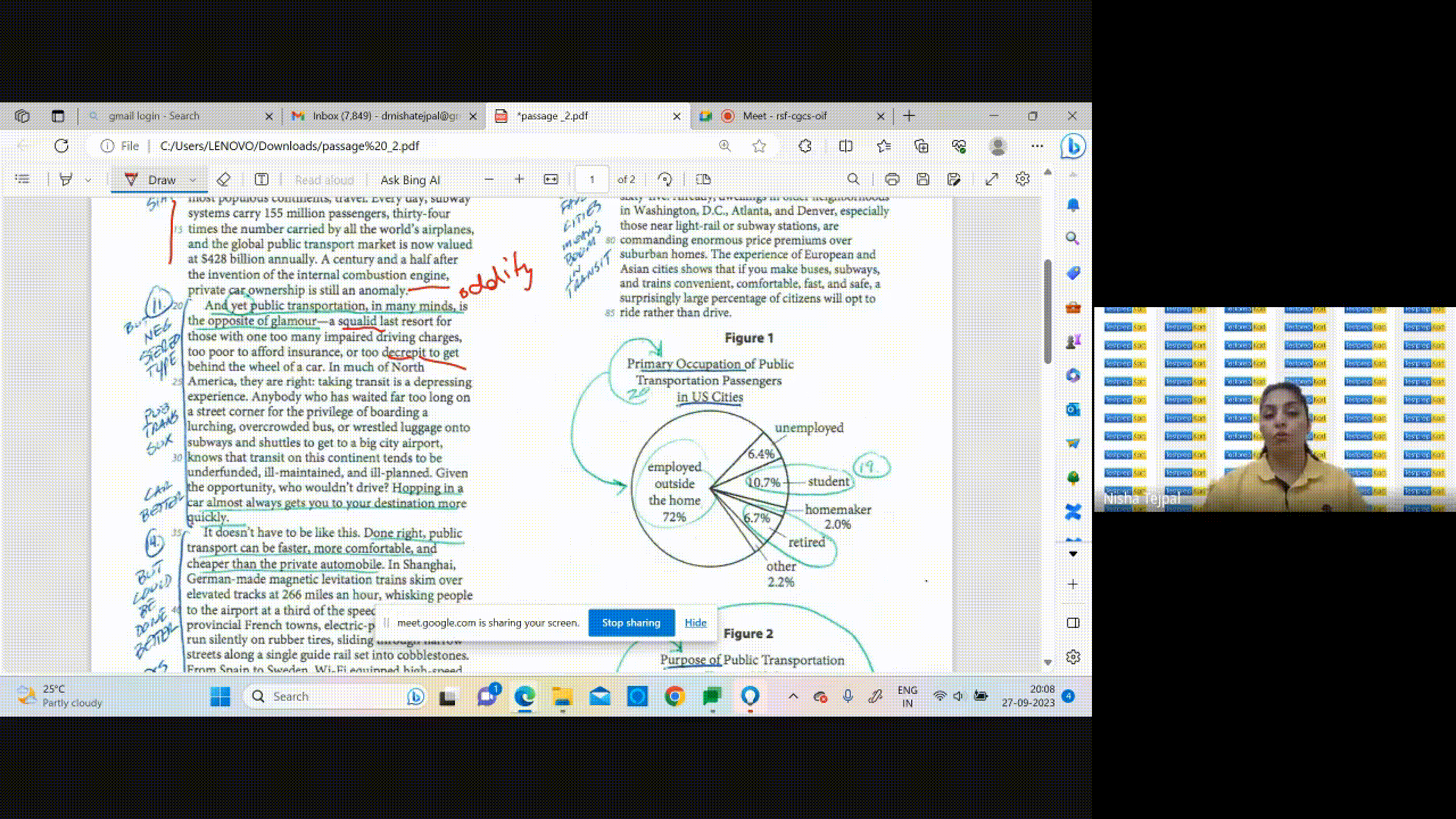
Digital SAT Live Test Session ( Testprepkart Students):
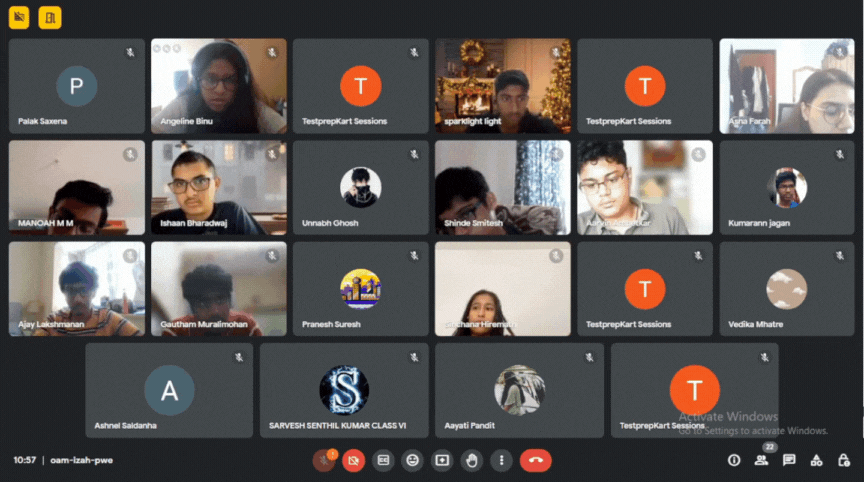
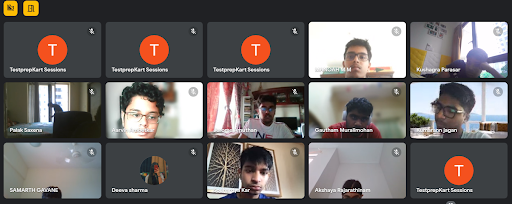
Get Free SAT Live Session Now !
Testprepkart Demo Session Video:
Explore the world of Testprepkart with our insightful Demo Session Video! . Join us for an in-depth preview of our courses, teaching methodologies, and unique features. Discover how we make learning effective and enjoyable for our students. Get a glimpse of what awaits you on your academic journey with TestPrepkart
. Watch the demo now and take the first step towards your success.
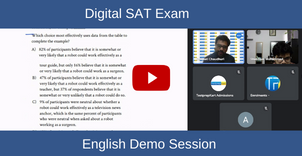 |
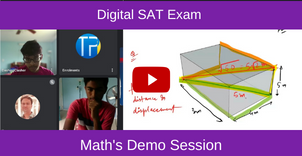 |
Get Free Demo Session Now !
Digital SAT Topic Wise Explanation Videos:
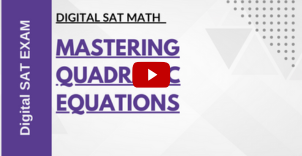 |
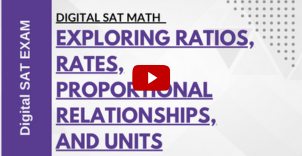 |
||
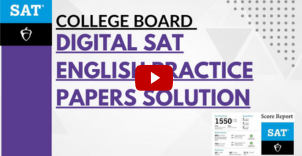 |
 |
Digital SAT Strategies To Solve Reading and Writing Section:
Digital SAT Strategies To Solve Math Section:
DOWNLOAD DIGITAL SAT STUDY MATERIAL !
TestprepKart SAT Students Review:
At TestprepKart we feel satisfied having worked closely with students and parents toward achieving a common objective of a Great SAT Score and Selection in a Good University. Here is what our students say about SAT coaching at TestprepKart.
.png) |
 |
||
 |
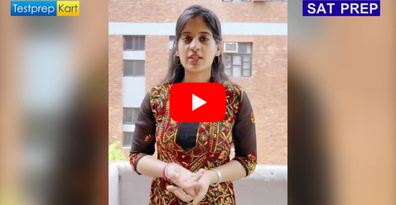 |
Why TestPrepkart?
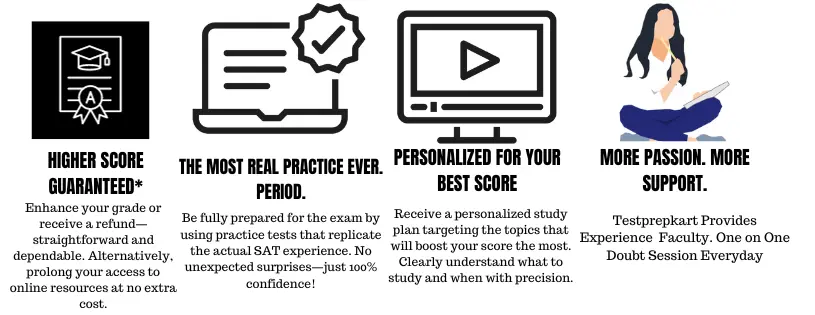
TestprepKart Digital SAT Preparation Online Features:
TestprepKart is the leading educational services company in the Middle Eastern region, targeting NRIs. We offer an online SAT preparation course that was developed with top SAT experts around the globe. They not only prepare for the online prep course, but some of them also take live SAT classes. Pick the one that suits your requirements, and we will deliver you the best SAT preparation ever.
- Highly Qualified SAT Expert Tutors: Teachers play the most important role in the student’s learning and progress. And there is no substitute for a qualified and experienced teacher. Thus, TestprepKart brings a panel of the most qualified and highly experienced faculty members to the SAT Coaching Online Course for their students. Our teachers belong to Harvard, Wharton, Yale, Stanford, and Maryland.

- SAT Online Classes: The SAT faculty takes the SAT online preparation course for half an hour every quarter for each student. One student will have one SAT Expert Tutor as a mentor and the mentor would be responsible for his or her smooth progress in the class as well as for helping him/her cope with stress and anxiety.
.png) |
.png) |
- SAT Preparation Test Series: SAT online preparation test Series are tests taken at regular intervals along with the progress in the syllabus to determine a student’s progress and performance in a test environment. It identifies a student’s weaknesses and strengths as well as benchmarks his/her performance with peers from across India and other countries.
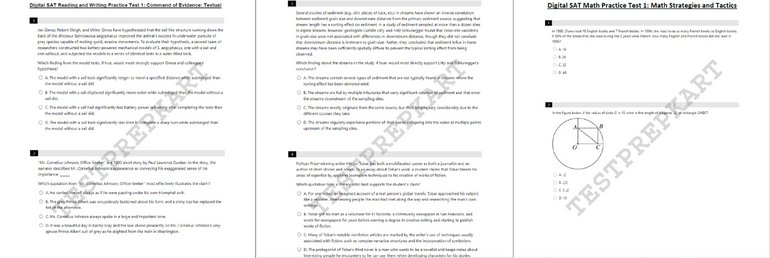
What is Digital SAT Exam ?
The Digital SAT Exam is a computer-based version of the traditional SAT, designed to modernize the test-taking experience and make it more accessible and efficient for students. Here are some key features and aspects of the Digital SAT Exam:
Certainly! Here’s the information about the Digital SAT Exam presented in a tabular format:
|
Aspect |
Description |
|
Format and Delivery |
– Computer-Based: Administered on a computer rather than on paper. Test Centers: Taken at designated test centers for standardized testing. |
|
Content and Structure |
– Similar Content: Includes sections on Evidence-Based Reading and Writing (ERW) and Math. Adaptive Testing: May adjust question difficulty based on performance. |
|
Test-Taking Experience |
– User Interface: Provides tools like a built-in calculator, annotation features, and a timer.Navigation: Allows easy movement between questions and digital note-taking. |
|
Benefits |
– Faster Results: Enables quicker score reporting compared to paper-based testing. Accessibility:Supports accommodations for disabilities (e.g., screen readers).Environmentally Friendly: Reduces paper use and waste. |
|
Preparation |
– Practice Resources: Offers online practice tests and digital study materials. Skill Assessment: Includes interactive elements to enhance critical thinking skills. |
This table summarizes the key aspects and features of the Digital SAT Exam, highlighting its format, benefits, and preparation options compared to traditional paper-based testing.
|
Feature |
Digital SAT (March 2024 – Present) |
Old Paper SAT (Before March 2024) |
|
Delivery |
Computer or tablet based |
Paper and pencil |
|
Test Length |
2 hours, 15 minutes |
3 hours, 15 minutes |
|
Sections |
2: Reading & Writing, Math |
3: Reading, Writing & Language, Math |
|
Scoring |
Same 400-1600 point scale |
Same 400-1600 point scale |
|
Adaptive Testing |
Yes, difficulty adjusts based on performance |
No, fixed difficulty |
|
Calculators |
Allowed throughout Math section (built-in or approved personal) |
Not allowed in all Math sections |
|
Score Reporting |
Results available within days |
Results available in 5 weeks |
Digital SAT Exam Highlights:
| Exam Name | SAT (Digital) |
| SAT full form | Scholastic Assessment Test |
| Official Website | https://www.collegeboard.org/ |
| SAT Exam Duration | 2 hours, 14 minutes |
| Most popular for | Undergraduate courses in the US and Canada |
| Conducted by | College Board |
| Mode of Exam | Online |
| SAT Fee for Indian Students | $60 + $43 + 18.54 = ₹10,075 (approximate) |
| Score Range | on a 1600 scale point |
| SAT Contact Info | The College Board National Office 250 Vesey Street New York, NY 10281 Phone: 212-713-8000 |
Digital SAT Exam Dates 2025 (International Students):
| SAT Test Date | Registration Deadline | Late Registration & Testing Changes Deadline |
| March 8, 2025 | February 21, 2025 | February 25, 2025 |
| May 3, 2025 | April 18, 2025 | April 22, 2025 |
| June 7, 2025 | May 22, 2025 | May 27, 2025 |
| August 23, 2025 | To Be Announced | To Be Announced |
| September 13, 2025 | To Be Announced | To Be Announced |
| October 4, 2025 | To Be Announced | To Be Announced |
| November 8, 2025 | To Be Announced | To Be Announced |
| December 6, 2025 | To Be Announced | To Be Announced |
- This college admission test is a Paper-based standardized test but according to the college Board, the SAT Exam is going to be completely Digital from 2023 for International Students and in 2024 for US Students.
- Digital SAT is conducted 7 times every year at the worldwide level in the month of March, May, June, August, October, November, and December, but for US students, the number of attempts is limited to 5.
- The knowledge and skills of students are tested on the basis of the Critical Reading section, Mathematics section, and Writing section.
- The SAT questionnaire is designed for a time duration of 3 to 4 hours, but now the digital SAT exam time is 2 hours.
- The scoring system is based on a scale of 200–800 on each of the substituent sections (total of 400–1600).
- The range of scores varies from 200 to 800 on each of the two sections, i.e., you can get a minimum score of 600 and a maximum score of 1600.
Digital SAT Exam Syllabus:
The Digital SAT Exam in covers topics that students have encountered in their school curriculum throughout the years. Proficiency in school studies should adequately prepare students for the SAT exam syllabus. The key components of the SAT syllabus are outlined as follows:
SAT Reading & Writing Section:
- Craft and Structure
- Information and Ideas
- Standard English Conventions
- Expression of Ideas
Math Section:
- Algebra
- Advanced Math
- Problem-Solving and Data Analysis
- Geometry and Trigonometry
SAT eBook:
It is very important to know minor to major facts when starting your preparation for an aptitude-based exam like SAT, with updates that can help with your SAT preparation.
We are pleased to announce the release of TestprepKart’s free SAT study guide for the new SAT. This free SAT ebook gives you everything you need to know about the test, from content to content mastery, among the top practice goals you need.
Digital SAT Preparation FAQs:
Q. What is SAT Exam?
A. The SAT, which stands for Scholastic Assessment Test, is a standardized test widely used for college admissions in the United States. It’s a multiple-choice, computer-based test designed to assess a high school student’s readiness for college-level work.
Here’s a breakdown of the SAT exam:
- Purpose: To measure a student’s writing, critical reading, and math skills, and provide colleges with a common data point for comparing applicants.
- Who takes it: Typically high school juniors and seniors.
- Administered by: The College Board.
- Format: multiple-choice questions (with no penalty for wrong answers).
- Duration: roughly 2 hours and 14 minutes.
- Sections: Divided into two main sections: reading & writing (combined) and math. There’s also an optional essay section.
While the SAT is an important factor in college admissions, it’s not the only one. Colleges will also consider your high school GPA, the difficulty of the courses you took, extracurricular activities, letters of recommendation, and your personal essay.
Q. Who should take the SAT Exam?
A. The SAT exam is primarily intended for high school students who are planning to apply to colleges or universities, particularly those in the United States. Here are some specific groups of students who should consider taking the SAT:
1. High School Juniors and Seniors
- College-Bound Students: Most students take the SAT in their junior year (11th grade) or the fall of their senior year (12th grade) to meet college application deadlines.
- Students Targeting Competitive Colleges: Many competitive colleges and universities require or strongly recommend SAT scores as part of the admissions process.
2. International Students
- Students Applying to U.S. Colleges: International students planning to apply to colleges in the United States often take the SAT to meet admissions requirements.
- Students Seeking Scholarships: Some scholarship programs for international students require SAT scores.
3. Students in Schools with SAT Requirements
- Schools with Mandatory Testing: Some high schools or school districts require all students to take the SAT, often as part of state or district-wide assessments.
4. Students Seeking Scholarships
- Merit-Based Scholarships: Many merit-based scholarship programs use SAT scores as a criterion for awarding scholarships.
5. Students Exploring Test-Optional Policies
- Optional Test Takers: Even if a college has a test-optional policy, students may choose to take the SAT to strengthen their applications, particularly if they believe their test scores will reflect their academic abilities well.
6. Students Planning to Retake the Test
- Improving Scores: Students who are not satisfied with their initial SAT scores may retake the exam to achieve a higher score.
Considerations
- Test Preparation: Students should consider whether they have enough time and resources to adequately prepare for the SAT.
- Alternative Exams: Some students may prefer to take the ACT, another standardized test widely accepted by U.S. colleges, depending on their strengths and test preferences.
- College Requirements: It’s important for students to check the specific testing requirements of the colleges they are interested in to determine if the SAT is necessary.
Q. How is the SAT exam structured?
A. The SAT exam is structured into four main sections, plus an optional essay section (which was discontinued in 2021). Here’s a detailed breakdown of each section:
1. Evidence-Based Reading and Writing
a. Reading Section
- Number of Questions: 52 questions
- Time Allotted: 65 minutes
- Content:
- Passages from U.S. and world literature, history/social studies, and sciences.
- Questions test comprehension, reasoning, and vocabulary in context.
- Includes paired passages and informational graphics (charts, tables, etc.).
b. Writing and Language Section
- Number of Questions: 44 questions
- Time Allotted: 35 minutes
- Content:
- Passages related to careers, history/social studies, humanities, and science.
- Questions focus on grammar, punctuation, sentence structure, and rhetorical skills.
- Tests ability to improve and edit passages.
2. Math
a. Math Test: No Calculator
- Number of Questions: 20 questions
- 15 multiple-choice questions
- 5 grid-in questions (student-produced response)
- Time Allotted: 25 minutes
- Content:
- Algebra, problem-solving, data analysis, and some advanced math topics (trigonometry and complex numbers).
b. Math Test: Calculator
- Number of Questions: 38 questions
- 30 multiple-choice questions
- 8 grid-in questions
- Time Allotted: 55 minutes
- Content:
- Continuation of topics from the no-calculator section.
- Emphasis on complex equations and problem-solving in context.
3. Essay (Discontinued in 2021)
- Number of Prompts: 1 prompt (if taken)
- Time Allotted: 50 minutes
- Content:
- Students read a passage and analyze how the author builds an argument.
- Assessed on reading, analysis, and writing skills.
Total Testing Time
- Without Essay: 3 hours
- With Essay: 3 hours and 50 minutes (before discontinuation)
Scoring
- Reading and Writing Section: 200–800 points
- Math Section: 200-800 points
- Total Score: 400–1600 points
- Essay Score: Scored separately on a scale of 6–24 (when it was part of the test)
Additional Features
- Evidence-Based Reading and Writing: Combines the Reading and Writing sections into a single score.
- Math: Split into two portions to assess ability both with and without a calculator.
- Passage-Based Questions: This section predominantly features questions based on passages in the Reading and Writing sections.
- Grid-In Questions: Requires students to produce their own answers rather than choosing from multiple-choice options.
Test Preparation
Students are encouraged to prepare using official SAT practice materials, prep courses, and practice tests to become familiar with the test structure, timing, and question types.
Q. What’s the importance of the SAT for NRI students?
A. For non-resident Indian (NRI) students, the SAT holds particular importance for several reasons, especially if they are planning to pursue higher education in the United States. Here are key points highlighting the importance of the SAT for NRI students:
1. College Admissions
- U.S. Colleges and Universities: The SAT score is widely accepted by most U.S. colleges and universities as a part of the admissions process. NRI students aiming to apply to these institutions will often need to submit SAT scores.
- Standardized Metric: The SAT provides a standardized measure to compare applicants from different educational backgrounds, which is particularly useful for NRI students coming from diverse schooling systems.
2. Scholarship Opportunities
- Merit-Based Scholarships: Many colleges and external organizations offer scholarships based on SAT scores. High scores can significantly increase the chances of receiving financial aid and scholarships.
- Specific NRI Scholarships: Some institutions have scholarships specifically for NRI students, and SAT scores can be a crucial factor in the selection process.
3. College Readiness and Placement
- Course Placement: Some colleges use SAT scores to place students in appropriate coursework levels, particularly in subjects like math and English.
- College Readiness: The SAT assesses critical thinking, analytical skills, and knowledge in key areas, helping colleges gauge a student’s preparedness for college-level work.
4. Competitive Edge
- Enhancing Applications: Strong SAT scores can enhance a student’s college application, making them more competitive, especially for selective institutions.
- Compensating for GPA: If an NRI student’s high school GPA is not as strong due to various factors, high SAT scores can help balance their application.
5. Test Optional Policies
- Choosing to Submit Scores: Even if some colleges have adopted test-optional policies, submitting strong SAT scores can still be beneficial for NRI students to showcase their academic abilities.
6. Global Recognition
- International Acceptance: While primarily used for U.S. admissions, the SAT is also accepted by many universities around the world, including in countries like Canada, the UK, Australia, and Singapore. This global recognition provides flexibility for NRI students who may be considering multiple destinations for their higher education.
7. Understanding U.S. Education System
- Adapting to U.S. Standards: Preparing for and taking the SAT can help NRI students become familiar with the academic expectations and standards of the U.S. education system, aiding in a smoother transition.
8. Academic Development
- Skill Improvement: The preparation for the SAT can help students improve their critical reading, writing, and mathematical skills, which are beneficial for their overall academic development.
Summary
For NRI students, the SAT is a valuable tool that can open doors to educational opportunities in the United States and other countries. It can help in gaining admissions, securing scholarships, and providing a competitive edge in the college application process. Preparing for the SAT also helps students develop important academic skills that are essential for success in higher education.
Q. How can NRI students register for the SAT Exam?
A. NRI (Non-Resident Indian) students can register for the SAT exam through the same process as other international students. Here are the steps to register for the SAT exam:
1. Create a College Board Account
- Visit the College Board Website: Go to the official College Board website here.
- Create an Account: Click on the “Sign Up” button to create a new account if you don’t already have one. You will need to provide basic information, such as your name, address, and high school details.
2. Choose a Test Date and Location
- Test Dates: Review the available test dates on the College Board website. The SAT is offered several times a year.
- Test Centers: Find and select a test center near your location. The College Board provides a list of international test centers.
3. Register for the SAT
- Log In: Use your College Board account credentials to log in.
- Start Registration: Begin the registration process by clicking on “Register for the SAT.”
- Personal Information: Fill in your personal details, including your high school information and your intended college major or interests.
- Test Date and Center: Select your preferred test date and test center from the available options.
4. Upload a Photo
- Photo Requirements: Upload a recent, recognizable photo that meets the College Board’s requirements. This photo will be used for your admission ticket and ID verification at the test center.
5. Pay the Registration Fee
- Fee Payment: Pay the registration fee using a valid credit/debit card. The fee for international students is higher than for students testing in the United States. Additional fees may apply for late registration, changing test dates, or changing test centers.
- Fee Waivers: Check if you are eligible for a fee waiver. The College Board provides fee waivers for students who demonstrate financial need, but availability may vary for international students.
6. Confirm Registration
- Review and Submit: Review all the information you have provided to ensure it is correct.
- Print Admission Ticket: After submitting your registration, print your admission ticket. You will need to bring this ticket, along with a valid photo ID, to the test center on the exam day.
7. Prepare for the Exam
- Study Materials: Utilize SAT preparation materials available on the College Board website, such as practice tests, study guides, and official SAT prep courses.
- Plan Your Study Schedule: Create a study schedule leading up to the exam date to ensure you are well-prepared.
Important Tips
- Check Deadlines: Be aware of registration deadlines for your chosen test date. Registering early helps ensure you get your preferred test center and date.
- International Dates and Policies: Be mindful of any specific policies or additional requirements for international test centers. Some test centers may have limited availability or additional documentation requirements.
By following these steps, NRI students can successfully register for the SAT exam and take an important step toward their college admissions journey.
Q. What is the Testprepkart’s role in SAT preparation?
TestprepKart is an educational platform that specializes in providing online coaching and preparation resources for various standardized tests, including the SAT. Here’s how TestprepKart can help students, including NRI students, prepare for the SAT:
1. Comprehensive Online Courses
- Structured Curriculum: TestprepKart offers structured SAT courses that cover all sections of the exam, including Evidence-Based Reading and Writing, Math, and essays (if applicable).evidence-based
- Live Classes: Live, interactive online classes are conducted by experienced instructors who provide personalized guidance and support.
2. Expert Instructors
- Experienced Tutors: TestprepKart employs highly qualified and experienced instructors who are experts in their subjects and familiar with the SAT format and question types.
- Personalized Attention: Small class sizes and individual attention help address specific student needs and learning styles.
3. Study Materials and Resources
- Practice Tests: Full-length practice tests mimic the actual SAT, helping students get accustomed to the test’s format and timing.
- Study Guides: Detailed study guides and textbooks covering key concepts and strategies for each section of the SAT.
- Question Banks: Extensive question banks with a variety of practice questions and solutions to enhance problem-solving skills.
4. Performance Tracking and Feedback
- Regular Assessments: Periodic assessments and quizzes to monitor progress and identify areas needing improvement.
- Detailed Feedback: Constructive feedback on practice tests and assignments to help students understand their mistakes and improve their scores.
5. Customized Study Plans
- Personalized Plans: Customized study plans based on individual strengths and weaknesses to optimize preparation time and effort.
- Flexible Schedules: Flexible scheduling options to accommodate different time zones and busy student schedules.
6. Additional Support
- Doubt Clearing Sessions: Regular doubt-clearing sessions where students can ask questions and clarify their doubts with instructors.
- College Admissions Guidance: Support with the college admissions process, including help with applications, essays, and understanding college requirements.
7. Global Accessibility
- Online Platform: Being an online platform, TestprepKart is accessible to students worldwide, making it particularly convenient for NRI students who may not have access to local SAT prep resources.
- Convenient Access: Students can access classes and resources from anywhere, eliminating the need for commuting to physical coaching centers.
8. Community and Peer Learning
- Interactive Forums: Online forums and discussion groups where students can interact with peers, share resources, and collaborate on study strategies.
- Group Studies: Opportunities for group study sessions to foster collaborative learning and peer support.
Conclusion
TestprepKart plays a significant role in SAT preparation by providing a comprehensive suite of resources and support tailored to meet the needs of students, including those living outside India. Their focus on personalized learning, expert instruction, and flexible access makes them a valuable resource for students aiming to achieve high scores on the SAT.
Q. How does TestPrepKart support NRI students preparing for the SAT?
A. TestprepKart provides specialized support for NRI (non-resident Indian) students preparing for the SAT, addressing their unique needs and challenges. Here’s how TestPrepKart supports NRI students:
1. Tailored Curriculum and Resources
- Customized Study Plans: TestprepKart offers personalized study plans tailored to each student’s strengths, weaknesses, and learning pace. This customization helps NRI students efficiently prepare for the SAT despite varying educational backgrounds.
- Comprehensive Materials: Access to extensive study materials, including textbooks, practice tests, and question banks, ensures students have all the resources they need.
2. Live Online Classes
- Interactive Sessions: Live, interactive online classes led by experienced instructors who specialize in SAT preparation. These sessions allow for real-time questions and feedback.
- Flexible Scheduling: Classes are scheduled to accommodate different time zones, making it convenient for NRI students to attend without disrupting their regular school schedules.
3. Expert Instructors
- Qualified Tutors: TestprepKart employs highly qualified and experienced tutors who are well-versed in the SAT format and content. These instructors provide expert guidance and tips specific to the SAT.
- Personal Attention: Small class sizes ensure that each student receives individual attention and personalized support.
4. Regular Assessments and Feedback
- Diagnostic Tests: Initial diagnostic tests to assess the student’s current level and identify areas for improvement.
- Frequent Practice Tests: Regular full-length practice tests that simulate the actual SAT experience, help students build test-taking stamina and time management skills.
- Detailed Feedback: Comprehensive feedback on practice tests and assignments, highlighting strengths and areas needing improvement.
5. Doubt Clearing and Support Sessions
- Doubt Clearing Sessions: Dedicated sessions for students to ask questions and resolve doubts with instructors, ensuring clarity on difficult concepts.
- 24/7 Support: Access to an online support system where students can ask questions and get answers outside of regular class hours.
6. Performance Tracking and Reports
- Progress Tracking: Continuous tracking of student performance through assessments and practice tests, allowing for adjustments to study plans as needed.
- Detailed Reports: Regular performance reports sent to students and parents, providing insights into progress and areas that require more focus.
7. College Admissions Guidance
- Application Assistance: Support with the college application process, including help with filling out applications, writing essays, and preparing for interviews.
- Scholarship Information: Guidance on available scholarships for NRI students and assistance with the application process for these scholarships.
8. Peer Interaction and Community
- Interactive Forums: Online forums and discussion groups where students can interact with peers, share experiences, and study collaboratively.
- Group Studies: Opportunities for group study sessions to enhance learning through peer support.
9. Global Accessibility
- Online Platform: Being entirely online, TestprepKart is accessible from anywhere, allowing NRI students to prepare for the SAT without the need for physical coaching centers.
- Consistent Access: Students can access recorded sessions, study materials, and practice tests anytime, providing flexibility in their study schedules.
Conclusion
TestprepKart supports NRI students in preparing for the SAT by offering a tailored and flexible approach that addresses their unique needs. Through personalized study plans, expert instruction, regular assessments, and comprehensive resources, TestprepKart ensures that NRI students are well-prepared to achieve high scores on the SAT and succeed in their college admissions journey.
Q. What math topics are on the SAT?
A. The SAT Math section covers a range of topics that are typically taught in high school math courses up to the beginning of the senior year. These topics are divided into four main categories:
1. Heart of Algebra
This category focuses on linear equations, inequalities, and systems of linear equations. Key topics include:
- Linear Equations and Inequalities: Solving single-variable and multivariable linear equations and inequalities, interpreting linear functions.
- Systems of Linear Equations and Inequalities: Solving systems of equations (both algebraically and graphically) and understanding their solutions in a real-world context.
- Linear Functions: Analyzing and interpreting linear functions and their graphs.
2. Problem Solving and Data Analysis
This category deals with quantitative literacy, including the ability to use ratios, percentages, and proportional reasoning to solve problems in various contexts. Key topics include:
- Ratios, Rates, Proportions, and Percentages: Understanding and solving problems involving ratios, rates, proportions, and percentages.
- Quantitative Data: Interpreting and synthesizing information from graphs, tables, and charts.
- Descriptive Statistics: Understanding measures of central tendency (mean, median, mode) and variability (range, standard deviation).
3. Passport to Advanced Math
This category includes topics that are typically found in more advanced math courses. These questions require the manipulation of complex equations and functions. Key topics include:
- Quadratic Equations: Solving quadratic equations by various methods (factoring, completing the square, quadratic formula), and interpreting their graphs.
- Polynomials: Understanding polynomial functions and their properties.
- Exponential Functions: Solving problems involving exponential growth and decay, and interpreting their graphs.
- Radicals and Rational Exponents: Simplifying expressions involving radicals and rational exponents.
- Rational Functions: Understanding the Properties and Graphs of Rational Functions.
4. Additional Topics in Math
This category includes topics in geometry, trigonometry, and basic arithmetic. Key topics include:
- Geometry and Trigonometry: Understanding and solving problems related to angles, circles, triangles, and other geometric shapes. This includes the use of the Pythagorean theorem, the properties of parallel and perpendicular lines, and basic trigonometric functions (sine, cosine, and tangent).
- Complex Numbers: Performing operations with complex numbers and understanding their properties.
- Volume and Area: Calculating the volume and surface area of three-dimensional shapes and the area and perimeter of two-dimensional shapes.
Calculator and No-Calculator Sections
The SAT Math section is divided into two parts:
- No-Calculator Section: Consists of 20 questions (15 multiple-choice and 5 grid-in questions) to be completed in 25 minutes. This section assesses basic arithmetic, algebra, and geometry skills without the use of a calculator.
- Calculator Section: Consists of 38 questions (30 multiple-choice and 8 grid-in questions) to be completed in 55 minutes. This section covers a wider range of math topics, including those that may require more complex calculations.
Summary
The SAT Math section evaluates a student’s ability to solve problems, interpret data, and understand mathematical concepts across a variety of topics. Thorough preparation should include practice with all these types of problems and familiarity with the types of questions typically asked on the test.
Q. Is the SAT essay necessary for NRI students?
A. As of January 2021, the SAT Essay section has been discontinued and is no longer offered as part of the SAT exam. Therefore, whether you are an NRI (non-resident Indian) student or any other student, you do not need to take the SAT essay, as it is no longer a component of the SAT test.
Previously, the SAT Essay was an optional section where students were given a passage and asked to analyze how the author constructed their argument. It was scored separately on a scale of 6 to 24 and was often required or recommended by some colleges and universities.
However, with the discontinuation of the SAT essay, students now only need to focus on the main sections of the SAT: reading, writing, language, and math. These sections contribute to the total SAT score, which ranges from 400 to 1600.Therefore, NRI students, like all other students, should prepare for and take only the main SAT sections—reading, writing, and Language, and Math—without concern for the SAT Essay.
Q. Can NRI students take the SAT in their home countries?
A. Yes, NRI (Non-Resident Indian) students can take the SAT in their home countries. The SAT is administered internationally in many countries around the world, including India and other locations where there are significant populations of Indian nationals.
Here are key points regarding NRI students taking the SAT in their home countries:
Availability of Test Centers
- The College Board, which administers the SAT, has a network of authorized test centers globally. These centers are located in major cities and sometimes in other urban areas to accommodate students.
- Test centers in India are spread across various cities, making it accessible for NRI students residing there or nearby.
Registration Process
- NRI students can register for the SAT online through the College Board’s website (collegeboard.org). The registration process is the same as for students in the United States.
- During registration, students can select their preferred test center from the available options in their home country or nearby locations.
Test Dates
- The SAT is offered several times a year, typically in October, November, December, March, May, and June. Exact test dates and availability may vary by location, so it’s essential for students to check the College Board website for specific dates in their region.
Test Day Requirements
- On the day of the SAT exam, NRI students must bring their admission ticket (printed after registration), a valid photo ID (passport or government-issued ID), and any required materials (e.g., calculator for the Math section).
Benefits of Taking the SAT in Home Countries
- Convenience: Taking the SAT in one’s home country can be more convenient and cost-effective for NRI students compared to traveling to other countries for the exam.
- Familiar Environment: Testing in a familiar environment can potentially reduce test anxiety and help students perform at their best.
Preparation
- NRI students preparing for the SAT can utilize various resources available online, including official SAT practice tests, study guides, and prep courses.
- TestprepKart and other online platforms offer specialized SAT preparation tailored to the needs of NRI students, helping them achieve competitive scores for college admissions.
In summary, NRI students have the opportunity to take the SAT in their home countries through authorized test centers. This accessibility allows them to pursue their educational goals and apply to colleges and universities in the United States and other countries that accept SAT scores for admissions.
Q. How often is the SAT exam conducted?
A. The SAT exam is typically conducted several times a year, offering students multiple opportunities to take the test. Here are the key points regarding the frequency and scheduling of the SAT:
Regular Test Dates
- The SAT is administered on specific test dates throughout the year. Historically, these dates have been:
- October
- November
- December
- March
- May
- June
Additional Test Dates
- In recent years, the College Board has occasionally added additional test dates to accommodate student demand or to address specific circumstances, such as during the COVID-19 pandemic when additional testing opportunities were provided.
Test Centers and Availability
- Test centers are located worldwide, allowing students to choose a location that is convenient to them. However, the availability of test dates and locations may vary by region, so students should plan accordingly and register early to secure their preferred test date and location.
Registration Deadlines
- Registration deadlines for the SAT typically fall several weeks before the test date. It is recommended for students to register early to avoid late fees and ensure a spot at their preferred test center.
Flexibility and Options
- Students can choose which test date works best for their schedule and allows them ample time to prepare adequately.
- The College Board also provides options for students who may require accommodations due to disabilities or other special circumstances, ensuring fair access to the SAT exam.
Special Circumstances
- During certain periods, such as the COVID-19 pandemic, the College Board may adjust test dates or offer additional options for students affected by testing center closures or other disruptions.
Summary
Overall, the SAT exam is conducted multiple times per year to accommodate the needs of students planning to apply to colleges and universities. NRI students and others preparing for the SAT should check the College Board website regularly for updates on test dates, registration deadlines, and any changes to testing policies or procedures. This helps ensure they can plan effectively and choose the best test date available to them.
Q. What will be the quality of online classes?
A. The quality of online classes for SAT preparation, such as those offered by platforms like TestprepKart, can vary based on several factors. Here are key considerations that contribute to the quality of online SAT classes:
1. Expertise and Experience of Instructors
- Qualified Tutors: High-quality online SAT classes are typically led by experienced instructors who have expertise in SAT content and strategies.
- Teaching Methodology: Effective instructors employ interactive teaching methods, clear explanations, and personalized attention to help students grasp challenging concepts.
2. Curriculum and Content Coverage
- Comprehensive Curriculum: Well-structured courses cover all sections of the SAT (Reading, Writing and math) and include strategies for each.
- Relevance to Test Content: Courses align closely with the current SAT format and content, ensuring students are well-prepared for the actual exam.
3. Interactive Learning Environment
- Engagement: Classes should encourage student participation through discussions, polls, and interactive activities to maintain engagement.
- Feedback and Interaction: Opportunities for students to ask questions, receive feedback on practice tests, and interact with instructors contribute to a supportive learning environment.
4. Quality of Study Materials
- Practice Tests and Resources: Access to official practice tests, study guides, and supplementary materials helps students reinforce their learning and gauge their progress.
- Updated Content: Materials should be regularly updated to reflect any changes or revisions in the SAT exam format and content.
5. Technological Infrastructure
- Platform Reliability: A stable online platform with features like video streaming, chat functions, and document sharing enhances the learning experience.
- User-Friendly Interface: Easy navigation and access to course materials contribute to a seamless learning process for students.
6. Student Support Services
- Doubt Clearing Sessions: Scheduled sessions where students can ask questions and clarify doubts with instructors.
- Administrative Support: Assistance with registration, scheduling, and technical issues to ensure smooth participation in classes.
7. Flexibility and Accessibility
- Scheduling Options: Flexible class schedules to accommodate different time zones and student availability.
- Recording Availability: Access to recorded sessions for review or in case of missed classes, providing flexibility and convenience for students.
8. Student Success Metrics
- Track Record: Positive testimonials, success rates in SAT scores, and student outcomes indicate the effectiveness of the online classes.
- Progress Tracking: Regular assessments and progress reports help students and instructors monitor improvement and adjust study plans as needed.
Conclusion
The quality of online SAT classes ultimately depends on the expertise of instructors, the comprehensiveness of the curriculum, the interactivity of the learning environment, and the support services provided. Platforms like TestprepKart aim to deliver high-quality SAT preparation through a combination of expert instruction, comprehensive materials, interactive learning tools, and personalized support, catering to the needs of students preparing for the SAT exam.
Q. How are Testprepkart’s SAT preparation online courses are different than others?
A. TestprepKart distinguishes itself in the realm of SAT preparation with several unique features and approaches that set it apart from other online SAT prep courses:
1. Specialization in International Students
- Focus on NRI Students: TestprepKart caters specifically to Non-Resident Indian (NRI) students, understanding their unique educational backgrounds and needs.
- Customized Approach: Courses are tailored to address the specific challenges and requirements of NRI students preparing for the SAT.
2. Expert Instructors and Personalized Attention
- Qualified Tutors: TestprepKart employs experienced tutors who are well-versed in the SAT exam format, content, and strategies.
- Small Class Sizes: Ensures personalized attention and allows for interactive teaching methods that cater to individual student needs.
3. Comprehensive Curriculum and Resources
- Structured Courses: Courses cover all sections of the SAT—Reading, Writing and Language, and Math—with a focus on in-depth content coverage and strategy development.
- Official Practice Tests: Access to official College Board practice tests and comprehensive study materials to simulate the actual SAT exam experience.
4. Technological Infrastructure and User Experience
- Advanced Online Platform: Utilizes a robust online platform with features such as live classes, interactive sessions, and multimedia resources for an engaging learning experience.
- Ease of Access: User-friendly interface that facilitates easy navigation and access to course materials, ensuring a seamless learning process.
5. Focus on Test-taking Strategies
- Strategy Sessions: Dedicated sessions on SAT test-taking strategies, including time management techniques, tackling different question types, and maximizing score potential.
- Practice Drills: Specific drills and exercises designed to improve speed, accuracy, and confidence in answering SAT questions.
6. Support Services and Flexibility
- 24/7 Student Support: Availability of support services for students, including doubt clearing sessions, administrative assistance, and technical support.
- Flexible Scheduling: Offers flexible scheduling options to accommodate diverse time zones and student availability.
7. College Admissions Guidance
- Application Assistance: Guidance on college admissions processes, including assistance with applications, essays, and understanding college requirements.
- Scholarship Information: Information and support for accessing scholarships and financial aid opportunities for international students.
8. Performance Tracking and Feedback
- Progress Monitoring: Regular assessments and practice tests to track student progress and identify areas for improvement.
- Detailed Feedback: Comprehensive feedback on practice tests and assignments to help students understand strengths and weaknesses.
9. Community and Peer Learning
- Interactive Forums: Online forums and discussion groups for students to interact, share resources, and collaborate on study strategies.
- Group Study Sessions: Opportunities for collaborative learning through group study sessions and peer support.
Conclusion
TestprepKart stands out by combining specialized support for NRI students with expert instruction, comprehensive resources, and a commitment to student success in the SAT exam. Their tailored approach, focus on international student needs, and emphasis on both content mastery and test-taking strategies make them a valuable choice for NRI students preparing for the SAT

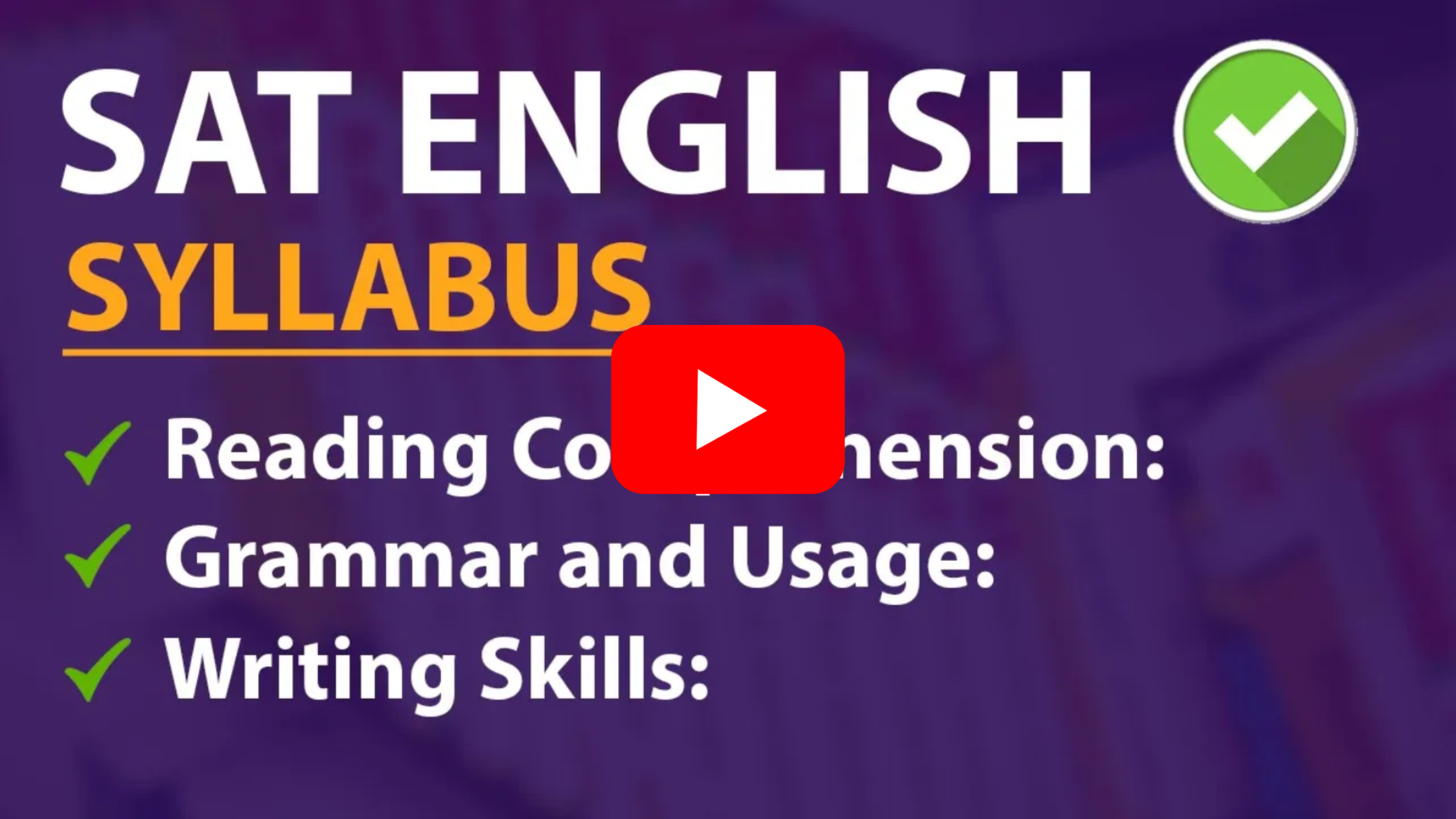

.webp)
Leave a Reply